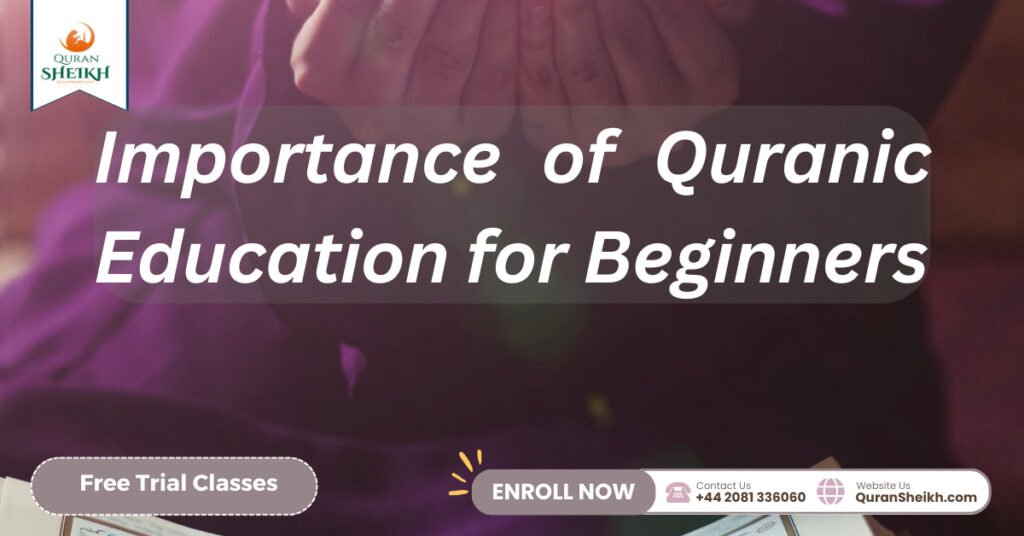Learning the Quran for beginners: Quran is the main religious book of Islam. It has instructions and practices that could promote an individual’s spiritual growth to better comprehend their world hence. This is invaluable knowledge.
The act of starting to learn the Quran can be intimidating, more so to those who beginners are. Quranic education or teaching its basics will be reviewed here and some information for beginners, who aim to go on this way. Some of the basic topics we will discuss include covering areas aimed at helping you learn and understand the Quran. Some topics of interest are Arabic comprehension, memorization and recitation with Tajweed.
Join thousands of Muslim Families who love learning Quran, Arabic and Islamic Studies from the comfort of their Homes.
Introduction to Learning the Quran

Understanding the Quran can be challenging to some, especially those who have no experience with Arabic or Islamic doctrine. However, depending on the right training and outlook, such experience may prove spiritually rewarding as well as intellectually enriching.
Such an article seeks to present the Quran. It will address the importance that it holds essentials of Arabic teaching as well as comprehending Quranic syntax and terminology.
What is the Quran?
Muslims consider the Quran as their revealed text; it according to them is the word of Allah (God) and was conveyed by Prophet Muhammad through Gabriel over a period of 23 years.
It’s the source of Islam-based law, ethics and spirituality that has guidance on all known life matters.
Why Learn the Quran?
Studying the Quran is more than performing a religious obligation for Muslims; it becomes an avenue of self-development and spiritual fulfillment.
By studying the teachings of the Quran, one can achieve a complete understanding, develop an unbreakable relationship with God and find comfort during adversity. In addition to that it has also been observed in the fact that by studying the Quran one can improve their Arabic language skills along with improving critical thinking.
Importance of Quranic Education for Beginners

Spiritual Benefits of Quranic Education
Increased exposure to the Quran allows beginners to build a stronger relationship with Allah and improve their Islam. Both reciting and reflecting upon its verses can bring peace and calmness to the heart by a way of seeking forgiveness and guidance.
Academic Benefits of Quranic Education
Cognitive abilities such as the memory level and analytical thinking in an individual’s educational goals can be sharpened by mastering the Quran. Some of the activities that can improve memory retention include memorizing verses and continuing to recite them over a period, while analyzing the meaning behind each text promotes critical thinking skills.
Social Benefits of Quranic Education
Such a deep dive into the Quran can bring about certain social advantages, strengthening their bonds as Muslims. The stage serves as a unifying ground for people of different backgrounds to come together in this knowledge sharing and understanding their familiarity and comprehension of Islam.
Quran Memorization Course Online with an Arab teacher with 30% Off
Basic Arabic for Quranic Recitation

Arabic Alphabets and Pronunciation
The word of the Quran is in Arabic, and correct pronunciation of its language does important work that makes it possible to perform an effective recitation. Learning the Arabic alphabets and their corresponding sounds should be appropriate with beginners, as well as teaching them individual letter pronunciation rule sets.
Short Vowels and Diacritical Marks
The Quran uses short vowels and diacritical marks to indicate pronunciation and meaning alongside alphabets. Beginners should be taught the variety of vowel marks and their corresponding sound values, along with position in words.
Long Vowels and Shadda
The Quran also employs long vowels and shadda (gemination) for meaning and emphasis. Beginners should be able to distinguish between long and short vowels as well as the application of shadda in the sentence.
Understanding Quranic Grammar and Vocabulary
Nouns and Verbs in the Quran
The Quran has a diverse collection of nouns and verbs which express its message Knowledge of basic rules grammar surrounding nouns and verbs, can help in better understanding the meaning behind Quranic verses that is why it needs beginners studying Arabic to provide more insight into what they are reading.
Arabic Morphology and Meanings in the Quran
The understanding of the Quranic words and sentences is validated when Arabic morphology (i.e., that which examines form or structure) comes into play because it provides a deeper view on word construction.
For beginners, it is suggested that they get familiar with the various forms of words and their derivations in the Quran along with its interpretations and connotations.
Word Roots and Derivations in the Quran
Multiple words in the Quran have a common root. This provides clues to their concept and significance. Beginners should know how to identify root words and their different forms of derivations, as well as how they are used differently at various places within the Quran.
Memorizing Quranic Verses and Surahs
In order to learn the Quran correctly, one must memorize verses and surahs. Learn how you can easily and effectively memorize with these tips:
Benefits of Memorization
There are many benefits to memorizing Quranic verses and surahs. Memorizing aids in comprehending the message of the Quran and how to practice it, boosts attention and loyalty and results with strong memory power further enhances spiritual focus.
Memorization Techniques
Memorization techniques include repetition, association, visual relationships and listening. Try to stick with a fixed timetable for memorization, break the verses into smaller chunks and try revising what you have already learnt.
Practice Tips for Memorization
To learn memorization, begin with repeatedly reading the verses or the surah and repeating until a person is able to recite without looking at it. After that, try it without looking and see if there are errors. Lastly, recite it integrated in a surah.
Reciting the Quran with Tajweed
Tajweed is the science of reciting the Quran with proper pronunciation, intonation, and rhythm. These are some suggestions that can help you to develop your Tajweed abilities.
What is Tajweed?
Tajweed involves the pronunciation of letters, recitation inflections, sound elongations and shortening as well as halts or pauses. Tajweed facilitates a proper recitation of the Quran, saving the original meaning in its word and makes it beautiful.
Rules of Tajweed
The key rules of Tajweed include the proper articulation of the alphabet’s letters, differentiating sounds that are similar to each other, using vowels in appropriate places and tone melody for reading. Such rules can be taught effectively by a good teacher.
Practice Tips for Tajweed
First, learn the basic rules of Tajweed and then practice them with a teacher or leader. You could record yourself speaking and listen back, or speak to a friend while providing feedback for each other.
Tips for Effective Quranic Learning
In order to get an optimal Quranic learning, it is necessary to follow some rules and instruments.
Time Management Strategies
Allot daily time and duration for Quranic learning, which should be monitored closely. Establish a timetable that would strike balance with your other obligations and values.
Learning Resources and Tools
Resource examples may include using a real Quranic text, terms dictionary in the Quran and online resources including podcasts, learning applications and videos. Have a support system of trusted friends and family members. They can help you in any stage of your education.
Setting Learning Goals
Figure out the goals for studying the Quran. Make sure that they are specific and measurable. Such as memorizing a surah, Tajweed or reading a certain number of pages per day. Celebrate success and achievements during the voyage.
Conclusion and Next Steps for Quranic Education
The process of learning the Quran may be a lifetime journey, as we can uncover new knowledge every step along our way. Do not forget these important factors to be taken into account.
Review of Key Concepts
The basic elements of Quranic education are memorizing verses and surahs, improving Tajweed, effective time management and goal setting.
Final Thoughts
Quranic learning can be quite challenging. However, in fact and spiritually it gives us several advantages. This makes the effort worthwhile. In order to guarantee success, try your best to stay motivated and be patient in all that you do.
Next Steps for Continuing Quranic Education
Keep learning and getting from trained teachers or mentors, attend Quran classes or programs, join virtual communities of the Holy Book.
Since the process of learning from the Quran is more like a lifelong goal, therefore you can learn to make it better with each day and no one should ever think that he or she has gone late because anyone who now knows how to read hasn’t missed. In sum, Quran memorization could be a lifelong pursuit.
This article contains useful tips and advice that can help beginners to develop a good foundation for Quranic education. This journey offers countless rewards.
The Quran has a plethora of opportunities for spiritually developing relationships with God, gaining knowledge and wisdom as well. Some of the benefits from Quranic Education are available to beginners who approach it patiently, persistently and by seeking knowledge.
Can you memorize Quran alone?
Yes, you can memorize the Quran as a single individual. Although having a teacher or study group may be helpful, it is important to note that many individuals have memorized the Quran on their own through self-study and consistent effort.
Here are some tips for memorizing the Quran alone:
- Set realistic goals. Do not try to memorize so much in one fell swoop. Begin with a modest target, one verse per day for example, and adjust your objective upwards as you advance.
- Be consistent. Attempt to learn at the same time daily, even though it might be for just a few minutes. The more you practice, the easier it will be to memorize.
- Use multiple methods. Many methods of memorizing the Quran are available. Some prefer listening to some verses of the Quran by recording or watching videos; others consider that it is helpful specifically if they read them aloud. Try different techniques to determine what is best for you.
- Review regularly. Once you’ve committed a verse to memory, it is necessary that you go revise it each day. Make efforts to review the memorized verses at least once a day.
If you have difficulty memorizing the Quran individually, there are numerous sources that can assist in such a case. There are available online courses, books and apps that aid in guiding a person. You can also interact with Quran memorization communities both online and in real life where you come across other individuals who are taking the same journey.
The process of memorizing the Quran is not particularly easy, but it gives great satisfaction. With a determined spirit and time, every person can memorize the Quran without regard to age or learning pattern.
How can I memorize the Quran verses?
Here are some tips on how to memorize the Quran verses:
- Set realistic goals. Try not to memorize as many verses at a time. Begin with a little, like one ayah each day and then grow your objective as you get used to it.
- Recite aloud and rehearse. The repeated saying of verses will also enhance memorizing them. Attempt to practice aloud at least three times each day, and review the passages you have memorized no less than once per week.
- Use mnemonic devices. Mnemonic devices refer to memory aids that ease the memorization process. For instance, sing or write a poem using the verses you seek to memorize; visualize them.
- Interpret the verses. Understanding the meanings of verses will help you remember them better. It is advisable you try to read the translated passages of verses and think about their contents.
- Make it a habit. As you continue to memorize the Quran, it will get easier. Attempt at least five minutes of memorization every day, if possible.
Here are some additional tips that may help you memorize the Quran verses more effectively:
- Pick a location and time where you won’t be interrupted.
- While studying these verses, it is advisable you listen to recordings by a good reciter who recites these verses.
- Teach the verses to another person.
- Pray to Allah for the ability of memorizing the Quran.
Memorization of the Quran is a great gift, and it takes time. However, with these pointers one can make the process simpler and also fun.
Best Quran memorization program with qualified Arab tutors and get 30% OFF, Quran classes for Kids
FAQ
How long does it take to memorize the Quran?
A wide range of factors can affect the speed with which someone learns the Quran such as; Arabic endorsement, routine activity and discipline to study. On the other hand, gradual diligence and practice leads to some amount of awareness about the Quran for beginners within several months.
Do I have to know the Arabic language before learning the Quran?
Despite the fact that mastering Arabic in studying the Quran is not mandatory; it can significantly improve students’ progress. It is advisable for beginners to learn the rudimentary basics of Arabic such as alphabet and pronunciation before engaging in Quranic education.
Should one memorize the Quran?
While memorization is not obligatory, it comes highly recommended. It can assist in developing a better understanding and connection with the Quran.
Memorization can also help one recite verses and surahs as well easily during prayer and other religious practices.
Is it possible to learn the Quran online?
Many online tools are available for those who want to learn about the Quran. These resources provide access to virtual lessons, electronic books and online videos.
It is important to research widely and select only reliable sources so that the information would be accurate and trustworthy.


